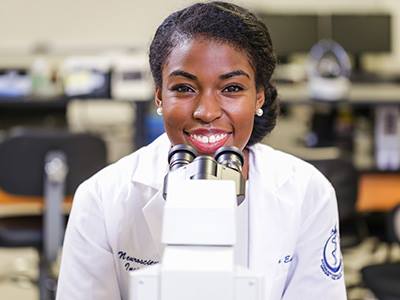 At Spelman College, biology is more than simply learning about the human anatomy and how living organisms function. When Spelman students pursue a degree in biology, they also receive an education with impact, earning them the distinction of becoming global citizens. Through study abroad opportunities, many students travel to countries such as Australia, South Africa, Japan, India, China, England, Ghana, Sierra Leone and Spain. While in those countries, students study the marvels of marine biology, explore unique sea life, help create safe water facilities, build hospitals and schools in Africa, and also perform research on maternal/child health. Such study abroad opportunities serve to debunk the myth that biology students are too busy to participate in activities normally associated with nonscience majors.
At Spelman College, biology is more than simply learning about the human anatomy and how living organisms function. When Spelman students pursue a degree in biology, they also receive an education with impact, earning them the distinction of becoming global citizens. Through study abroad opportunities, many students travel to countries such as Australia, South Africa, Japan, India, China, England, Ghana, Sierra Leone and Spain. While in those countries, students study the marvels of marine biology, explore unique sea life, help create safe water facilities, build hospitals and schools in Africa, and also perform research on maternal/child health. Such study abroad opportunities serve to debunk the myth that biology students are too busy to participate in activities normally associated with nonscience majors.
Pictured: Jasmine Eatman, C'2017, current M.D./Ph.D student, Emory University School of Medicine
A major in biology consists of 42 semester hours of coursework in biology. The course of study for the major in biology (B.S.) is described below. Please refer to the latest College Bulletin for full requirements and course descriptions.
• Bio 110 Biological Communities, Evolution and Biodiversity (4)
• Bio 115 Organismal Form and Function (4)
• Bio 120 Cellular Biology (4)
• Bio 125 Molecular Biology (4)
• Bio 285 Sophomore Seminar (1)• Bio 485 Senior Seminar (1)
In partnership with the Neuroscience Institute of Morehouse School of Medicine, Spelman College’s Department of Biology offers a novel five-year BS/MS program in neuroscience, the only program like this in the country.
This unique dual-degree program is designed to provide undergraduates with neuroscience research training early in their academic careers. Participants finish with Bachelor of Science and Master of Science Degree in Neuroscience.
According to the latest National Science Foundation data (2015), of the 1100 neuroscience Ph.D.s awarded, 30 were to African Americans. On average, 52% of these degrees went to women. So at best, there may be 15 African-American women with this training.
Sheena D. Brown, Ph.D., MSCR
Assessment Director and Associate Professor | Meharry Medical College Physician Assistant Sciences Program
Dr. Brown currently serves as the assessment director for the Meharry Medical College Physician Assistant Sciences Program and had more than nine years of experience in PA education. She received her Ph.D. in Molecular and Systems Pharmacology and Master of Science in Clinical Research from Emory University. She is also a proud graduate of Spelman College where she earned a Bachelor of Science in Biology. She has over 15 years of translational and clinical research experience in the areas of pediatric asthma, health disparities, and alcohol-induced lung injury.
She has also served as the principal investigator and project director of a HRSA-funded Primary Care Training and Enhancement Grant. The primary goal of this funding was to increase the number of public health trained PAs providing evidence-based primary medical care to Georgia’s rural and medically underserved communities and increase student diversity through recruitment of persons from rural and/or medically underserved communities, underrepresented minorities (URMs), and veterans.
It's time to explore our beautiful campus! Sign-up today, bring your family, and let us show you what will make Spelman College your home away from home!